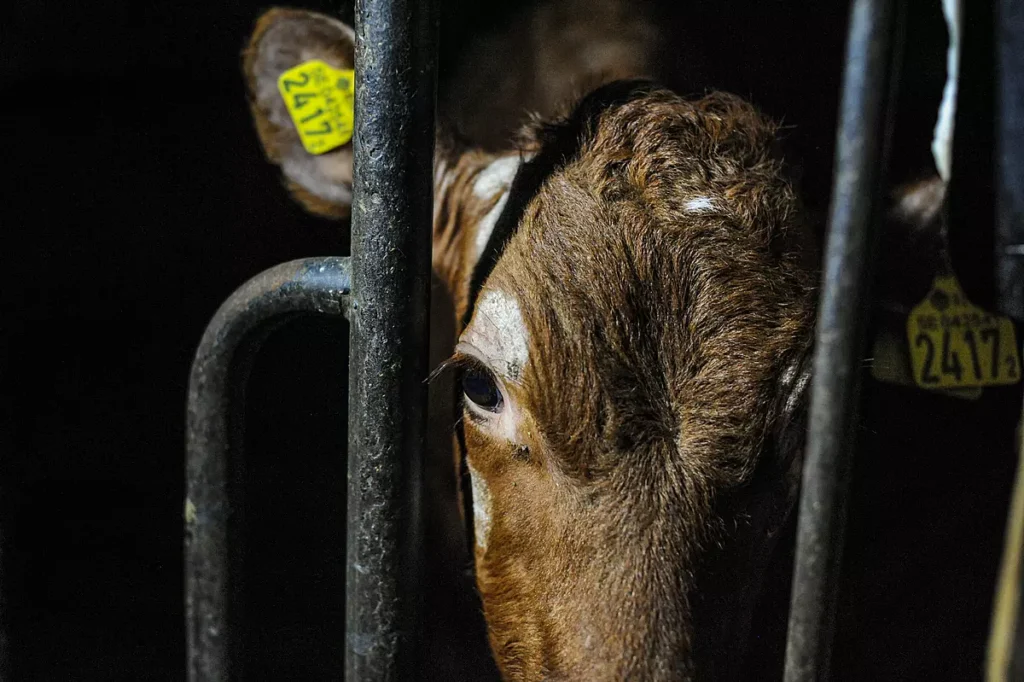State Senate and Assembly, by nearly unanimous margins, sent anti-confinement measure to Governor Murphy for his signature
Washington, D.C. – Today Animal Wellness Action, the Animal Wellness Foundation, and the Center for a Humane Economy applauded state lawmakers in New Jersey for passing a measure to ban gestation crates by an overwhelming vote of 35 to 1. The Assembly previously passed the measure by a count of 73 – 1. S. 1298/A.1970 seek to ban the cruel practice of confining pregnant sows in immobilizing crates, as well as calves raised for veal. The bill, which was sponsored by Sen. Vin Gopal and Assemblyman Raj Mukherji, now goes to Gov. Phil Murphy for a signature and he is expected to do so.
The legislative action comes just a month after the Supreme Court of the United States upheld California’s Prop 12, which not only affords breeding sows and veals calves definite minimum space requirements, but also restricts the sale of pork that comes from confinement operations. Some Midwest lawmakers have now introduced legislation, known as the Exposing Agriculture Trade Suppression Act, to repeal any state laws that restrict agricultural commerce. Animal Wellness Action and hundreds of other animal welfare, food safety, states’ rights, and other organizations have announced their opposition to that ill-considered, anti-democratic legislation.

“We must move past the era of immobilizing animals for years on end as a customary animal-rearing strategy, said Wayne Pacelle, Animal Wellness Action president and senior vice-president at the Center for a Humane Economy. “Immobilization is a form of punishment and torment, not a responsible way to raise animals.”
Breeding pigs may spend up to three years intensively confined in a crate barely larger than the animal, resulting in extreme physical and psychological torment. The sow may weigh 300-600 pounds, and the 2-by-7 crate immobilizes her, inhibiting her from even turning around or taking more than a half step. Pigs raised for meat are not kept in these restrictive crates.
“Confining sows in crates that immobilize them is demonstrably inhumane and there are widely accepted and applied alternative housing methods,” said Jim Keen, D.V.M., Ph.D., the director of veterinary sciences for the Center for a Humane Economy. Dr. Keen served on the faculty at the University of Nebraska College of Veterinary Medicine and also worked for USDA for 20 years at the National Meat Animal Research Center.
“Keeping a sow in a two-foot-wide crate is akin to stuffing a large-bodied animal in a tiny little closet and never letting her out,” said Thomas Pool, D.V.M., the senior veterinarian with Animal Wellness Action. A retired Colonel in the U.S. Army, Dr. Pool grew up on a cattle ranch outside of Lawton, Okla. and served as the commander of the Army Veterinary Command.
Related to the New Jersey news, a national bill was recently introduced, the Pigs in Gestation Stalls (PIGS) Act, H.R. 2939, to ban the extreme confinement of mother pigs in gestation crates.
Almost every major food retailer in the United States — from McDonald’s to Costco to Aramark — has made a pledge to phase out sourcing pork from factory farms that confine sows in gestation crates, with most pledges originally set to take effect in 2022. Voters have approved all five ballot measures in four states to ban the use of gestation crates in Arizona (2006), California (two separate ballot initiatives in 2008 and 2018), Florida (2002), and Massachusetts (2016). Major pig-producing states, including Colorado, Michigan, and Ohio, are phasing out gestation crates by law.
Dr. Keen and Dr. Pool submitted a brief to SCOTUS in the challenge to Proposition 12 by the National Pork Producers Council and the American Farm Bureau Federation. Two AWA attorneys break down the Prop 12 case here. AWA and the Center also submitted a separate brief in the case. Read more on the briefs here.

